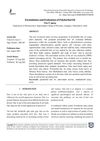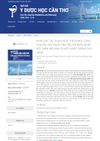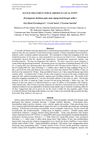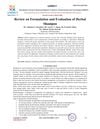 1 citations,
August 2021 in “International journal of scientific research in science and technology”
1 citations,
August 2021 in “International journal of scientific research in science and technology” The polyherbal hair oil promotes hair growth, reduces hair loss, and is safe to use.
 April 2024 in “Pharmacognosy research”
April 2024 in “Pharmacognosy research” The herbal hair dye with natural ingredients like henna was successfully made and tested, but more research is needed on its effectiveness on different hair colors and benefits.
 May 2023 in “Tạp chí Y Dược học Cần Thơ”
May 2023 in “Tạp chí Y Dược học Cần Thơ” The shampoo with grapefruit peel and Gleditsia sinensis helps mice grow hair faster, more, and longer.
[object Object]  January 2023 in “Journal of pharmacognosy and phytochemistry”
January 2023 in “Journal of pharmacognosy and phytochemistry” Herbal home remedies can effectively treat hair loss with fewer side effects.
 July 2023 in “Jurnal Ilmu Kesehatan Hewan”
July 2023 in “Jurnal Ilmu Kesehatan Hewan” Sulfur-based treatments combined with simparica effectively treat scabies in puppies.
 32 citations,
January 2012 in “International Journal of Dermatology”
32 citations,
January 2012 in “International Journal of Dermatology” Skin side effects from EGFR inhibitor cancer treatment can be managed effectively, often without stopping the medication.

Bee pollen, green tea, essential oils, and various plant extracts improve skin and hair health.
 1 citations,
November 2023 in “International Journal For Multidisciplinary Research”
1 citations,
November 2023 in “International Journal For Multidisciplinary Research” Herbal shampoos are safer and perform well, but need more research to improve quality.
 1 citations,
December 2021 in “International journal of research in dermatology”
1 citations,
December 2021 in “International journal of research in dermatology” Dermatologists should learn more about shampoos to better treat hair and scalp issues.
 March 2024 in “International Journal of Advanced Research in Science, Communication and Technology”
March 2024 in “International Journal of Advanced Research in Science, Communication and Technology” Herbal shampoos with plant-based ingredients can effectively promote hair growth, treat dandruff, and add shine.

The herbal shampoo effectively reduces dandruff and hair fall.
 May 2021 in “Boletín latinoamericano y del Caribe de plantas medicinales y aromáticas”
May 2021 in “Boletín latinoamericano y del Caribe de plantas medicinales y aromáticas” Microsechium helleri extract has antioxidant, anti-inflammatory, antidiabetic, and heart-protective benefits.

Wound healing is complex and requires more research to enhance treatment methods.
 434 citations,
October 2003 in “PTR. Phytotherapy research/Phytotherapy research”
434 citations,
October 2003 in “PTR. Phytotherapy research/Phytotherapy research” Natural products in cosmetics are beneficial for skin and hair care with low toxicity.
 101 citations,
July 2020 in “Dermatologic therapy”
101 citations,
July 2020 in “Dermatologic therapy” COVID-19 can cause skin issues like rashes and "COVID toes," and people with skin conditions should adjust their treatments if they get the virus.
 48 citations,
October 2011 in “Sports Medicine”
48 citations,
October 2011 in “Sports Medicine” Ice-skating athletes often have skin problems due to cold, infections, and inflammation, needing careful treatment and prevention.
 42 citations,
September 2018 in “Journal der Deutschen Dermatologischen Gesellschaft”
42 citations,
September 2018 in “Journal der Deutschen Dermatologischen Gesellschaft” Adult female acne requires a comprehensive treatment approach, including medical options and lifestyle changes, with attention to psychological well-being.
 31 citations,
September 2014 in “International Journal of Dermatology”
31 citations,
September 2014 in “International Journal of Dermatology” Anthralin is effective for psoriasis and alopecia with minimal systemic side effects but can irritate the skin.
[object Object]  28 citations,
January 2021 in “Parkinsonism & related disorders (Online)/Parkinsonism & related disorders”
28 citations,
January 2021 in “Parkinsonism & related disorders (Online)/Parkinsonism & related disorders” Parkinson's disease is linked to skin disorders and skin cells help in studying the disease.
 25 citations,
July 2021 in “Journal of Medical Virology”
25 citations,
July 2021 in “Journal of Medical Virology” COVID-19 can cause various skin issues, including rashes and hair loss, which usually heal on their own and don't always indicate severe illness.
 16 citations,
September 2018 in “Journal of Ethnopharmacology”
16 citations,
September 2018 in “Journal of Ethnopharmacology” Plant-based remedies may treat hair loss by reducing inflammation and improving insulin resistance.
 11 citations,
July 2020 in “International Journal of Ayurvedic Medicine”
11 citations,
July 2020 in “International Journal of Ayurvedic Medicine” Indigofera tinctoria leaf extract has many compounds that support its traditional medicinal uses.
 7 citations,
May 2014 in “Clinical practice”
7 citations,
May 2014 in “Clinical practice” Cooling the scalp may prevent hair loss from chemotherapy, hair often grows back after treatment, and nail issues usually improve after stopping the drug.
 6 citations,
July 2006 in “International Journal of Dermatology”
6 citations,
July 2006 in “International Journal of Dermatology” Football players can get many skin conditions from their sport, which need different treatments and can be prevented with good hygiene and protection.
 6 citations,
March 1999 in “Journal of pediatric health care”
6 citations,
March 1999 in “Journal of pediatric health care” The document emphasizes the need for primary care providers to understand and care for African American children's hair and skin to boost their self-esteem.
 4 citations,
February 2017 in “Journal of Cutaneous Medicine and Surgery”
4 citations,
February 2017 in “Journal of Cutaneous Medicine and Surgery” Compounds from certain trees used by First Nations people show potential for treating skin conditions and promoting hair growth, but more research is needed to confirm their safety and effectiveness.
 4 citations,
September 2014 in “Elsevier eBooks”
4 citations,
September 2014 in “Elsevier eBooks” Use some skin medications with caution during pregnancy; avoid strong steroids, certain eczema treatments, and systemic retinoids, but many topical treatments and nasal sprays are safe.
 2 citations,
February 2019 in “bioRxiv (Cold Spring Harbor Laboratory)”
2 citations,
February 2019 in “bioRxiv (Cold Spring Harbor Laboratory)” The Asiatic lion has very low genetic diversity and unique genetic traits, highlighting the need for its conservation.
 2 citations,
January 2014 in “Springer eBooks”
2 citations,
January 2014 in “Springer eBooks” The book details skin conditions in older adults, their link to mental health, cancer treatment importance, hair loss remedies, and managing autoimmune and itchy skin.
 1 citations,
May 2018 in “The journal of investigative dermatology/Journal of investigative dermatology”
1 citations,
May 2018 in “The journal of investigative dermatology/Journal of investigative dermatology” The symposium highlighted the importance of understanding disease mechanisms for targeted dermatology treatments.






























